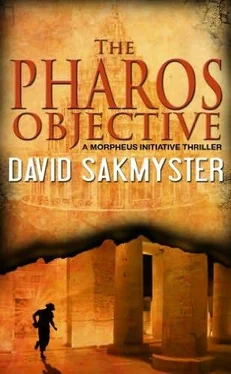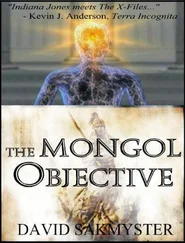David Sakmyster - The Pharos Objective
Здесь есть возможность читать онлайн «David Sakmyster - The Pharos Objective» весь текст электронной книги совершенно бесплатно (целиком полную версию без сокращений). В некоторых случаях можно слушать аудио, скачать через торрент в формате fb2 и присутствует краткое содержание. Жанр: Прочие приключения, на английском языке. Описание произведения, (предисловие) а так же отзывы посетителей доступны на портале библиотеки ЛибКат.
- Название:The Pharos Objective
- Автор:
- Жанр:
- Год:неизвестен
- ISBN:нет данных
- Рейтинг книги:3 / 5. Голосов: 1
-
Избранное:Добавить в избранное
- Отзывы:
-
Ваша оценка:
- 60
- 1
- 2
- 3
- 4
- 5
The Pharos Objective: краткое содержание, описание и аннотация
Предлагаем к чтению аннотацию, описание, краткое содержание или предисловие (зависит от того, что написал сам автор книги «The Pharos Objective»). Если вы не нашли необходимую информацию о книге — напишите в комментариях, мы постараемся отыскать её.
The Pharos Objective — читать онлайн бесплатно полную книгу (весь текст) целиком
Ниже представлен текст книги, разбитый по страницам. Система сохранения места последней прочитанной страницы, позволяет с удобством читать онлайн бесплатно книгу «The Pharos Objective», без необходимости каждый раз заново искать на чём Вы остановились. Поставьте закладку, и сможете в любой момент перейти на страницу, на которой закончили чтение.
Интервал:
Закладка:
Lydia pouted and kicked at the sand. She leaned against a pillar decorated with faded hieroglyphs.
“Besides,” Caleb added, “I gave up actively pursuing those visions. That was a part of my childhood, a piece of my former life that only brought misery.”
“Just try,” Lydia pleaded, tugging at his sleeve. “For me? We’re at the site of Isis’s temple. You may never get this opportunity again!”
He looked into her eyes for a long time, then finally nodded. “Nothing’s going to happen, though.”
“Not with that attitude.”
He shrugged, stepped around Lydia and leaned on a pillar, touching its rounded limestone surface and tracing the glyphs. Focusing on the chiseled grooves, he started to translate, picking up a portion of a hymn to Isis, praising her for begetting the sun, and suddenly he smelled smoke…
… and burning oil. Thick, oppressive. In the light of the braziers and torches, men with shaved heads and long blue robes are kneeling on a marble floor and inscribing letters onto long strips of papyri. A great arched roof spans overhead, brilliantly painted with a scene from the Book of the Dead in which Thoth judges the souls of the departed and greets a royal couple.
“Manetho,” someone calls. And he finds himself looking up, shocked to hear the Egyptian language spoken as it was over two thousand years ago. “We are almost finished,” says Vutan, one of the Hermopolis priests coordinating the translations.
“Good. Ptolemy Philadelphus will be pleased. These must go to Alexandria in all haste.”
He takes a moment to look around. They are deep under the earth, several levels below the main temple. Thick pillars support the roof, and strong walls, ancient walls built thousands of years ago, seal in this chamber. Two narrow air shafts lead up to the surface and serve to recycle the air. The materials here below are safe from the erosion of time that affects papyrus scrolls. And there are other earlier texts stored here, some inscribed on clay, others hammered into copper sheets and rolled.
And there ahead-two enormous, squat pillars. One of them plated with gold, the other with emerald. Deep, perfectly chiseled symbols carved over every inch.
Manetho has spent two decades studying these, the most ancient histories. He has used them to chronicle the kings of Egypt from the dawn of time until now. He has written treatises on magic, on philosophy and science; he has learned the ways of the heavenly bodies and the motion of the earth. But still, there are passages on these two pillars, lines of inscrutable text he cannot translate. And the priests will not reveal those secrets. Not yet, they say. Even though his name, Manetho, means ‘beloved of Thoth,’ they feel he is unworthy to know this most sacred wisdom.
There are dozens of translators at work, each copying partial sections only, undertaking the difficult tasks of translating the symbols into Greek, striving to keep even the phonetic elements the same. Later, these fragments will be integrated by a master craftsman and magician on ten tablets to be named The Books of Thoth. The wisdom from these pillars, Manetho knows, was translated from the one great artifact he has never been allowed to see-a tablet of pure emerald, what the priests claim is a miraculous, multi-layered book containing the most sacred wisdom.
Manetho has promised to collect both this tablet and the translation, and transport them to the Ptolemy’s new library. Even then, he will be accompanied by priests to prevent even a glimpse of the ancient words on the Emerald Tablet.
“Thank you,” he says again and clasps his hands together. “I will be outside, taking my supper. Call for me when you are finished.” He makes his way up the winding stairs, thinking upon all he has learned, questioning this legacy of learning.
For some time, he has sensed that plans were underway to move this knowledge, for the library’s safety has become compromised. The common people know of its existence, and while protected from the elements, the library can not be safeguarded from ignorant and malicious men who seek power.
Once outside, standing under the host of heaven with the great temple at his back, he looks up at the stunning constellations, at Osiris standing proud above the mighty Milky Way, at Sirius blazing at his feet. Manetho turns, and in the starlight he reads the inscription on the temple entrance: Isis am I, I am all that was, that is, and that shall be and no one of mortals has ever lifted my veil. And below this: Only the Golden Ones may enter and see the truth of the world. And then, a familiar but powerful symbol:
He thinks about the priests below, furiously translating and preparing the most ancient of books for the new library, hammering all that has been recorded into tablets. And Manetho suppresses a chill, knowing that despite all his learning, all his understanding, he is still considered impure, unworthy to pass beyond the veil and see the truth Caleb snapped back into the present, trembling in Lydia’s arms. After he had related his vision, she exclaimed, “But that would have been amazing to include, assuming you accurately saw through Manetho’s eyes.”
“Right, but that’s just it. I can never be sure of the accuracy of what I see.” He was still shell-shocked, slow in getting to his feet. “And even if it is true, how could we have footnoted it, Psychic vision, Caleb Crowe? ”
“You’re right.” Her smile broadened, then she frowned. “So, the ‘Golden Ones…’” She eyed the columns, picturing how the roof and the inscription would have appeared. “What do you think that means?”
Caleb sat and leaned against a pillar. He pictured the symbol again, remembered seeing it with a similar warning under the Pharos. He recalled what he had told Waxman four years earlier: “In the alchemist tradition, handed down from the surviving Hermetic writings, gold is the purest form of matter. So if you were to pass beyond the veil of Isis here, or beyond the doorway with a similar warning under the Pharos, I assume that you would have to first be somehow tested-purified and deemed worthy.”
Lydia laughed. “Oh, then we’re definitely not getting in, not after what we did last night.”
“Seriously, there are many early religions that expressed the world around us as a veil, a thin covering over the real world, which only initiates of the hidden mysteries could part.”
“What initiates?”
Caleb shrugged. “Egyptian mystery schools trained students in certain ways that elevated their spiritual essences, made them question the nature of the world and learn truths about reality.”
“Didn’t I read somewhere that Jesus might have spent time in Egypt?”
“That’s a theory,” Caleb said. “The Gospels are silent about the period of his life after the ‘kid in the temple’ incident and until he returns to Jerusalem and starts his ministry. Some occult sources claim he learned the backdrop of his teachings in the temples of Isis and Osiris, from the high priests of Delphi, that he had access to occult wisdom, and that he-”
“-passed beyond the veil,” Lydia finished.
Caleb slowly got to his feet. “Many of the Gospel verses are word-for-word translations of much earlier Egyptian sources. The first line of John is nearly verbatim from one of the Pyramid Texts, a hymn to Amun-Ra found in a two-thousand BC tomb. The Sermon on the Mount reads almost like a carbon copy of a speech Horus gave to his followers. And images inscribed on a temple wall in Luxor show Horus’s birth, surrounded by three solar deities who followed the star Sirius, with a previous panel depicting Thoth announcing the news to the virgin Isis.”
Lydia held up her hands and he stopped, unsure whether he should continue. She said, “Hey, don’t worry. I won’t hit you with charges of heresy. I haven’t been to Church in ten years.”
Читать дальшеИнтервал:
Закладка:
Похожие книги на «The Pharos Objective»
Представляем Вашему вниманию похожие книги на «The Pharos Objective» списком для выбора. Мы отобрали схожую по названию и смыслу литературу в надежде предоставить читателям больше вариантов отыскать новые, интересные, ещё непрочитанные произведения.
Обсуждение, отзывы о книге «The Pharos Objective» и просто собственные мнения читателей. Оставьте ваши комментарии, напишите, что Вы думаете о произведении, его смысле или главных героях. Укажите что конкретно понравилось, а что нет, и почему Вы так считаете.












